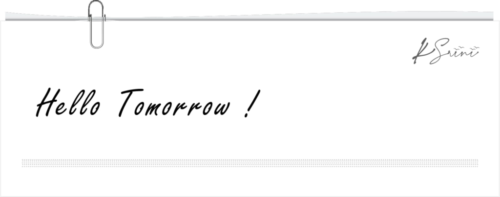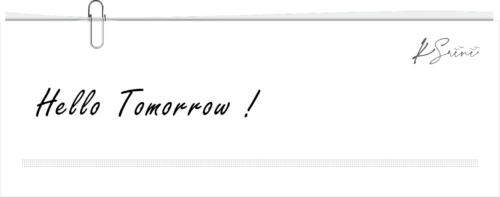It’s often debated & witnessed that even when most of us have the same access to resources some of us keep moving up the value chain either in terms of our learning, innovation, or new ways of doing work better, while the rest tend to be stuck where they were.
Why is it that among all the species it is only Humans that have evolved so much and so quickly?
Well, I guess, the answer lies in the mindset of Doing Things Differently. So, why do some of us Stop Doing Things Differently and stick to a routine? Is it a question of capability or something else?
Well, the capability could be an issue when we are looking at large scale innovation or paradigm shifts but not when it comes to minor day to day improvements and, ideas. It is often witnessed that we can improve a lot with the experience we gather over some time as ‘evolving is in the nature of our species’.
The reasons for not having the mindset of doing something for the first time could be different for each scenario. At the Micro level (individual), it could be a simple matter of upbringing wherein the environment disabled new thinking, or it could be a simple matter of Rewards & Risk.
At the organization level, when we deep dive we discover reasons which are interesting as well as baffling, Some of the reasons reflect our transactional mindset wherein we are living only for today and don’t envisage tomorrow.
To summarize, some popular reasons are:
- We don’t Celebrate Failure.
One of the biggest challenges that emerge is that we have stopped celebrating failures. When we attempt to do something for the first time it is obvious that not all attempts would lead to success; in fact, most of them would end as failures. At that juncture, what is our reaction? We reprimand the result or celebrate the mindset of attempting in the first place.
Celebrating failures is something that will enable all of us to keep walking and keep evolving. We should also ensure celebrating failures should not be confused with tolerating mistakes, as in finance we have to draw a line between error and omissions.
- Managers live for today
Why disturb the Apple Cart? Why think of tomorrow when I am not sure if I am going to be there? Why risk my reputation which I have built over all these years?
These are some of the mindset questions which drive the Managers which in turn disable the environment wherein new attempts at addressing the existing situations/way of doing things can be challenged.
- The Rewards / Recognition are Negligible
It is no secret that Behaviors that Get Rewarded Get Repeated.
The degree of reward/recognition influences all of us to think whether we should attempt moving out of our comfort zone or stick to the routine.
The pertinent questions to be here are- In the rewards & recognition framework do we have provisions for celebrating failures? Do we have provisions to highlight innovations of various degrees from small improvements to large innovations? Do we have provisions to highlight ideas that are not business viable but at the same time are cutting edge?
It is important & critical for all of us to appreciate and encourage the attempt of doing something for the first time rather than restricting ourselves to reward only if the end results happen to bring glory.
- Cut the Red Tape
The operation was successful but the patient died. Many times the ideas get killed in the process because they are either too lengthy and time-consuming or managed by people who do not believe in experimenting. If you want to promote innovations, cut the red tape reduce the process length and draw a straight line between idea generators and approvers.
- Are we ready for disruptions?
As a group how many are ready or comfortable with disruptions around us? Because any change in and around us, is bound to impact all of us somehow as we live in this highly connected & networked world.
An environment fostering disruptions, even welcoming it would result in many more attempts at doing something for the first time.
The idea/ thought of disabling the reason why we evolved so far as a species is quite discomforting. It’s time we relook at ourselves and re-energize the mindset which will encourage each one of us to do reflect on When was the last time, we did something for the first time . . . it’s time that we keep walking.

